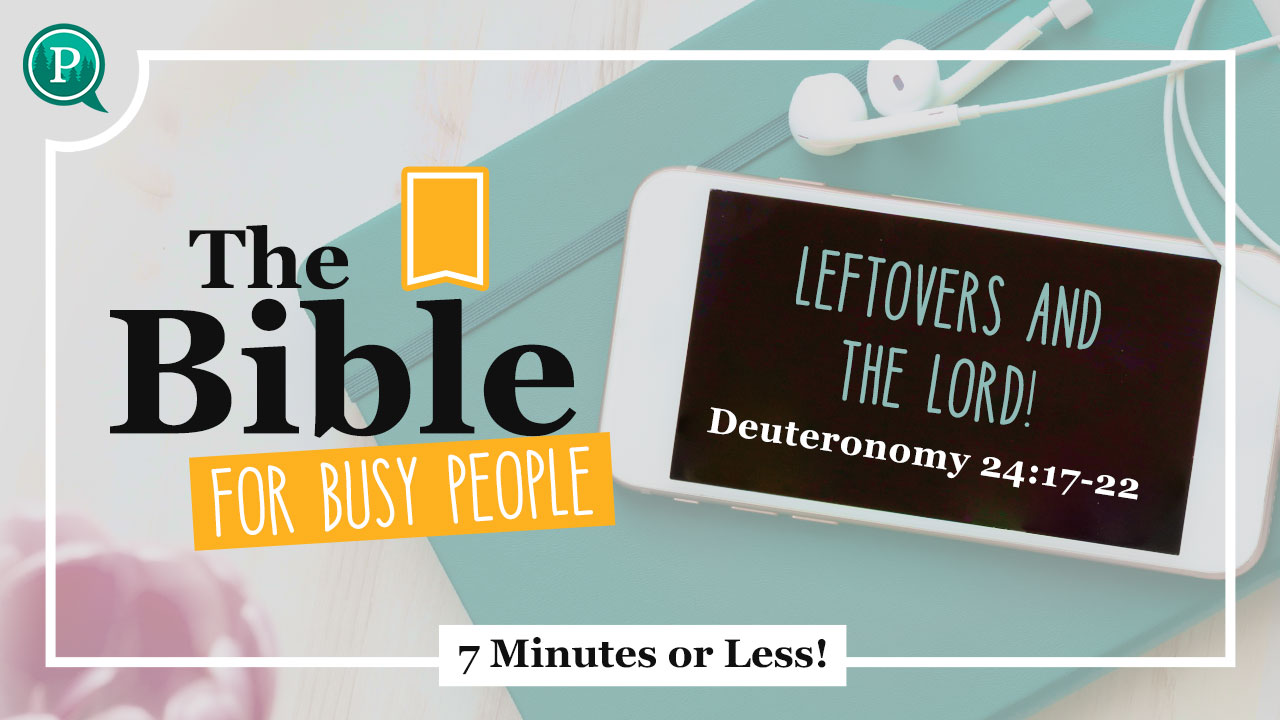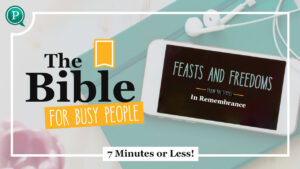Continuing in our Harvest series, we’re focusing today in the book of Deuteronomy; looking at leftovers and what God is teaching us about abundance and how we can all be generous with what we have.
Takeaway Verse: When you are harvesting your crops and forget to bring in a bundle of grain from your field, don’t go back to get it. Leave it for the foreigners, orphans, and widows. Then the Lord your God will bless you in all you do.
Show Links:
- Who Is Jesus?
- Have a prayer request? E-mail us at [email protected]
Transcription:
Hi, I’m Erica. Welcome to the Bible for Busy People. We are right here in the middle of a harvest series, diving in to see what God’s word has to say about harvest time. This is my absolute favorite time of the year. Everybody’s going to the pumpkin farms, getting the kettle corn and the hot spiced cider. So grab yourself your favorite hot beverage, coffee, cocoa, cider, whatever it is, and join me for a few minutes and let’s see what the Lord has to say about leftovers, shall we? We’re gonna be diving into the book of Deuteronomy way back in the Old Testament chapter 24. This is the Lord giving his people the Israelites, some instructions, and I think these instructions are gonna inspire you today.
“True justice must be given to foreigners, living among you and to orphans, and you must never accept a widow’s garment as security for her debt. Always remember that you were slaves in Egypt and that the Lord your God redeemed you from your slavery. That is why I have given you this command. When you are harvesting your crops,” this is our takeaway verse, verse 19, “and forget to bring in a bundle of grain from your field, don’t go back to get it. Leave it for the foreigners, orphans, and widows. Then the Lord your God will bless you in all you do. When you beat the olives from your olive trees, don’t go over the boughs twice. Leave the remaining olives for the foreigners, orphans and widows. When you gather the grapes in your vineyard, don’t glean the vines after they are picked. Leave the remaining grapes for the foreigners, orphans, and widows.” He says it again, He must mean it. “Remember that you were slaves in the land of Egypt. That is why I am giving you this command.”
Here we’re seeing a picture of the Lord’s tender, tender heart toward his people, and I think it’s absolutely beautiful, don’t you? He cares about the foreigner, the orphan, and the widow. It says a lot about the heart of the Lord, and it shows us that as God provides for us, you and I are to provide for others. One of the names of God in the Bible is Jehovah Jireh. He is our provider. So there might be times you open your pantry, this has happened to me, I’m embarrassed to say more times than I’d like to. You can’t fit something in there cuz you’ve got so much food. Maybe that’s the moment to take that extra jar of peanut butter to the food pantry, to your local food bank and help out and give that way. And then I also believe that God is showing us something just like he gave those farmers more than they needed. Like don’t pick up the stuff that’s dropped when people are gleaning the fields. He’s saying, I think that God gives us extra grace and extra forgiveness so that you and I can share that with others as well. Think about the story in the Bible of when the Lord Jesus fed the multitudes with five loaves of bread and a couple of fish. Think about that. He prayed to the Father, thanked God for the food that was provided, and he multiplied it for the thousands of people who were gathered to hear him preach the word. And at the end of the story, something very interesting happens. There are leftovers. Every single disciple, all 12 of them had an extra basket of loaves and fishes, 12 baskets of leftovers. I believe God is saying, I will always give you more, more than you need. So if you need forgiveness in your life today, if you’re like, God, I cannot forgive that person. He is willing to give you extra. It’s what he does. It’s who he is. He always does more than we could ever ask or imagine as Paul tells us in Ephesians chapter three.
You know, I ran into a friend the other day at the coffee shop, my friend John, and he was telling me forgiveness is really a religious word for letting go of the negative story. Take a moment right now and think about the negative storyline in your mind. I’ve got one, and it’s hard for me to let go of this one. What’s your negative storyline? What if you and I just put our palms up today and say, Lord, we release this story to you. We give this to you. I can forgive this person and let go of this negative storyline because you give me that extra grace and forgiveness, just like you gave the disciples extra loaves and fishes. Just like you gave those farmers, when you were talking about the Israeli farmers and the gleaning and the fields, just like you gave them more than they need, you give us more than we need. So Lord, we release this negative storyline into your capable hands. Huh? Doesn’t that feel better? In Jesus’ name. All right. Can’t wait till next time. In the meantime, remember, you are really loved.
We’d love for you to share this podcast with a friend and leave us a review. It helps us reach even more people with the hope of Jesus. This podcast is part of Purposely a podcast network designed with practical podcasts, to help you find and live in God’s purpose for your life, find more podcasts that will recharge you at onpurposely.com.
Follow this podcast:







